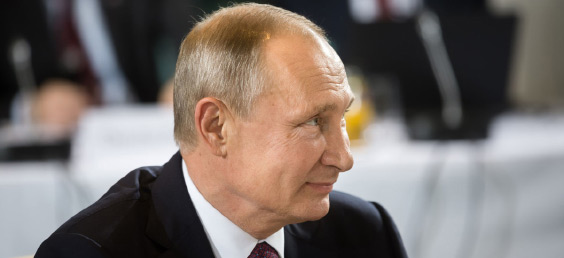The Lighthouse® is the weekly email newsletter of the Independent Institute.
Subscribe now, or browse Back Issues.
Volume 20, Issue 11: March 13, 2018
- Trump’s Trade War
- Pope Francis Errs on the Cure for World Poverty
- Putin’s Re-election Is Guaranteed
- Lights Out for Daylight Saving Time
- Independent Updates

President Trump’s tariff hike on imported washing machines in January led to immediate increases in the price of washing machines. The president’s new tariffs on steel (25 percent) and aluminum (10 percent), which go into effect later this month, will do far greater harm to consumers, because those commodities are inputs for so many other goods. “As a result, any production process that uses those materials, or their substitutes, will become more expensive and less efficient,” writes Independent Institute Senior Fellow Benjamin Powell, in a piece in Fortune magazine.
The Trump tariffs won’t result in fewer jobs overall, but by changing the composition of jobs in the economy, they will reduce worker productivity and shrink the size of the economic pie. Thus, “they’ll make us poorer and less efficient,” Powell notes. Trump’s tariffs also invite America’s trade partners to respond in kind, leading to further losses for U.S. businesses and consumers.
The European Commission, as Independent Institute Senior Fellow Alvaro Vargas Llosa explains in The Beacon, is erecting trade barriers for Harley-Davidson motorcycles (made in House Speaker Paul Ryan’s home state), bourbon (from Senate Majority Leader Mitch McConnell’s home state), and numerous farm products from the Midwest—Trump Country for the most part. “Let us hope the political backlash from part of the Republican base will do the trick,” Vargas Llosa writes. “If not, the consequences will be ugly in the U.S. and the rest of the world.”
Trump’s Tariffs Won’t Kill U.S. Jobs. They’ll Create the Wrong Ones, by Benjamin Powell (Fortune, 3/7/18)
Trump’s Trade War Has Ugly Consequences, by Alvaro Vargas Llosa (The Beacon, 3/7/2018)
Making Poor Nations Rich: Entrepreneurship and the Process of Economic Development, edited by Benjamin Powel
Lessons from the Poor: Triumph of the Entrepreneurial Spirit, edited by Alvaro Vargas Llosa

Pope Francis is hardly unusual in believing that poverty around the globe has gotten worse and that economic freedom is to blame. But when the pontiff makes such a false claim on the world stage—or has Cardinal Peter Turkson do so for him at Davos—it’s only appropriate that someone who understands the issue set the record straight. Independent Institute Research Fellow Robert P. Murphy, contributor to the book Pope Francis and the Caring Society, rises to the occasion in an op-ed for the Washington Examiner.
First, there’s the basic factual matter: Contrary to the pope’s claims, world poverty is falling, not rising, Murphy explains. More fundamentally, however, the pope falters in suggesting that economic freedom conflicts with basic human rights. In fact, they overlap. “Genuine human rights include what is called property rights,” Murphy writes. “Or to put it another way, since it is humans who own property, the defense of property rights is the defense of human rights.”
For much of the world, poverty has fallen drastically in the past few decades thanks to pro-market economic reforms. To accelerate this trend and eradicate extreme poverty sooner rather than later, it’s crucial that thought-leaders such as Pope Francis understand how markets actually work, including the role of entrepreneurship, free trade, property rights, and private investment in enlarging the economic pie. “Despite Pope Francis’s remarks to the contrary, economic freedom is a necessary condition for the respect of human rights, and history shows us quite clearly that the market economy is the best engine for delivering widespread prosperity,” Murphy concludes.
Pope Francis Has It Wrong on Global Poverty and Its Cure, by Robert P. Murphy (Washington Examiner, 2/28/18)
Pope Francis and the Caring Society, edited by Robert M. Whaples

Barring a truly extraordinary development—such as revelations of an epic scandal—Russian president Vladimir Putin is a shoo-in for Sunday’s elections. But even in the off chance that a second round of voting is necessary in April, Putin will surely win. The reason is that Putin is the only politically viable candidate to effectively tap into the national angst of his countrymen, as economist Yuri N. Maltsev, who contributed a brilliant essay in The Independent Review’s symposium on the legacy of the Russian Revolution, explains in an op-ed for The Hill.
“Putin’s electoral strategy, which has a tradition dating back to the times of Ivan the Terrible, is pretty simple: let as many candidates as possible run against him, and the more ridiculous they are, the better it is for his reputation,” Maltsev writes.
Admittedly, there is a bit more to it than that. The Putin government has, for example, neutralized what Maltsev calls “the only real threat to Putin’s presidential tenure”: It arrested its leading critic and rival, Alexei Navalny, leading to his being declared ineligible to run in the presidential election. The remaining candidate pool is filled largely with politicians unlikely to be taken seriously by prospective voters. This isn’t to say the campaign isn’t worth watching, however. In fact, few campaign moments in election history surpass the entertainment value of Civil Initiative presidential candidate (and TV anchor) Xenia Sobchak’s dousing neofascist mischief-maker Vladimir Zhirinovky with a glass of water during a recent nationally televised debate.
Why Putin’s Reelection Is Guaranteed, by Yuri Maltsev (The Hill, 3/9/18)
The Russian Revolution and Terror of Marxism-Leninism, by Yuri N. Maltsev (The Daily Caller, 10/31/17)

Worn out and frustrated by the ritual of changing your old clocks and recalibrating your sleep time? You don’t know half the problems it causes. “Daylight Saving Time (DST) is a scam,” writes Independent Institute Senior Fellow and Research Director William F. Shughart II, in a widely published op-ed.
Adopted as a wartime measure to give munitions workers an extra hour of daylight after time in the factory, the semi-annual clock-changing affair is associated with an uptick in heart attacks, more traffic accidents, and reduced worker productivity. Despite claims that DST conserves energy, researchers studying Australia and Indiana found that if DST has any impact on energy consumption at all, it probably increases rather than decreases energy demand.
“It is ludicrous to think that DST makes an extra hour of natural light available to anyone,” Shughart continues. “Depending on the season and distance from the equator, the sun shines the same number of hours per day no matter where your clock’s hands point or what its digits display.... Let’s hope that 2018 is the last year we lose an hour of sleep to ‘save’ an hour of sunlight at the end of the day.”
Turn Back the Clock on Daylight Saving Time, by William F. Shughart II (Philadelphia Inquirer, 3/9/18; Newsday, 3/9/18; and others)
The Beacon: New Blog Posts
- The Gender Gap: Discrimination or Choice?, by Mary Theroux
- A Catch-22 in Organizing for the Pursuit of Liberty, by Robert Higgs
- Trump’s Trade War Has Ugly Consequences, by Alvaro Vargas Llosa
- A Straightforward View of Morality and the Government, by Robert Higgs
MyGovCost: New Blog Posts
- Bullet Train Rolls On to $98.1 Billion Overall Cost Estimate, by K. Lloyd Billingsley
- President Trump’s First Trillion, by Craig Eyermann
- 57 Ways to Love a Killer, by K. Lloyd Billingsley
- New Fed Chair: U.S. “Not on a Sustainable Fiscal Path”, by Craig Eyermann






